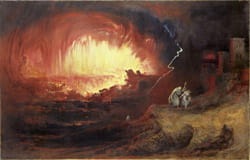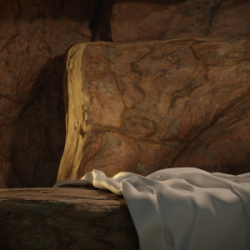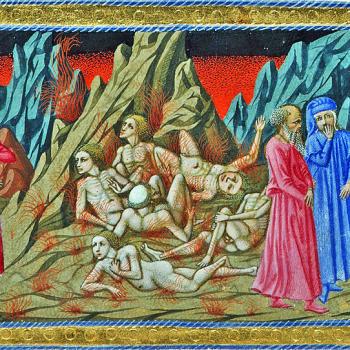The men say to Lot, look . . . get your family, even your married daughters and sons-in-law and get out of here! Lot went to his two married daughters and their husbands and tried to convince them to leave with him but he was laughed out of their homes by the sons-in-law. The men/angels tell him to cut his losses and get out with his wife and two unmarried daughters. He hemmed and hawed and finally the men pushed them out. The men told Lot’s family to get out and run to the mountain and don’t look back. Lot begged. He wanted to go to another city rather than the mountains. He negotiated with the angels and they finally settled on the city named Zoar. Then G-d destroyed the cities in a big show of fire and smoke. With all the confusion, Lot’s wife looked behind her and she immediately turned into a pillar of salt. [Why was this such a transgression? Well, when do we look back? When we are longing for something or missing something. And why should Lot’s wife pine for this horrible place or their horrible ways? And why salt? Well, one of the midrasha’s teach us that she sinned with salt when the men came to her house by refusing to give them any and criticizing her husband’s hospitality to these guests.]

So all this destruction freaked Lot out and he remembered that the angels were there to tell him to go to the mountain, so in his fear, he fled the city. He took his two daughters and fled to the mountains. While in the mountains, it seemed that the whole world had been destroyed. Lot’s two daughters were concerned. If the world has been destroyed, how will we repopulate? So they decided to -- okay folks, brace yourselves for this part -- get their father drunk and sleep with him. They both got pregnant with sons. The elder daughter named her son Moab and he is the father of the Moabite tribe. The name Moab literally means “seed of my father.” [Well, I suppose you can’t get more literal than that. The Moabites were then forever cast as the bad guys in our stories. Her transgression was great and the Moabites are pushed away from G-d. Moabite men cannot convert to Judaism; however, the women can and from these people we get one of our heroines, Ruth who is directly related to King David.] The younger daughter gives birth to a son named Ben-Ami, which means son of the people. Ben-Ami is the father of the Ammonites. And that is the end of Chapter 19.
Now we switch back to Avraham and Sarah’s story line. For those of you playing the home game, when last we heard from Abe and Sarah the angels had just delivered the news that Sarah will be delivering a much-awaited son. Avraham and Sarah head out on another trip and here again, as with Egypt in the last parsha, Abe calls Sarah his sister for fear of his life. One would have thought he learned his lesson from the last time. So Avimelech, the King of Gerar, took her but G-d came to him in his dreams and warned him that she was actually married. And yet again Avraham gets in trouble by the king, however we learn that Sarah was actually his half-sister or more likely, half-niece. [How is this so? Rashi brings down that grandchildren are like children and Abe and Sarah’s mother had the same father but not mother. Was that confusing enough for you? Let’s just say it’s a bit too close for our modern comfort.] So Avimelech and Avraham find a nice settlement where Avimelech gives him a bunch of land and animals and maids, etc., and they lived peacefully together for a while. Abe prays to G-d and helps out the Avi and his crew because they were barren as well. As it turns out, if you mess with someone as holy as the mother of the Jewish people, you might be made barren too.
In chapter 21, Sarah gives birth to a son, just like G-d promised them and they named him Yitzhak (Isaac). At eight days old, he is circumcised. [Why is this detail important? Because this is the first Jew to be born into the covenant with G-d. Prior to this it wasn’t a birthright and now Avraham made a covenant with G-d and a new nation would spring up.] Yitzhak is eight days old and Avraham is 100 years old. They made a big party and feast and celebrated this amazing event, but Sarah noticed Hagar, the servant, “making merry.” The Hebrew here isn’t exact. This could mean practicing idolatry, some form of illicit sexual relations, or encouraging the boys to get up and fight each other to the death. I know . . . those are very different options, but that is the beauty of Hebrew.
Needless to say, Sarah was furious and protective of this long-awaited child. She told Avraham that this woman and her son must go. G-d enforces this by telling Abe that he should listen to whatever Sarah tells him. I am not making this up, guys, G-d said, “Listen to your wife.” So the next morning Avraham got up and gave Hagar some food and water and sent them on their way. She was heading back home to Egypt but ran out of water so she put her son under a bush (mind you, he is at least 14 years old at this point) and walks away to cry and not watch him die. But G-d heard Ishmael cry and spoke to Hagar reassuring her that from his line would come a great nation (Islam). With that, they found some water and headed to Egypt and Ishmael married an Egyptian woman.





